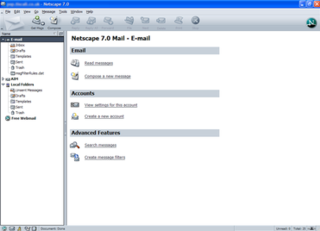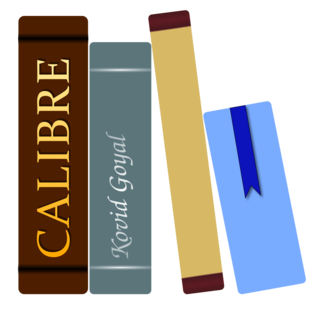
SpiderMonkey is the first JavaScript engine, written by Brendan Eich at Netscape Communications, later released as open source and currently maintained by the Mozilla Foundation. It is used in the Firefox web browser.

Mozilla Firefox or simply Firefox is a free and open-source web browser developed by the Mozilla Foundation and its subsidiary, the Mozilla Corporation. Firefox uses the Gecko rendering engine to display web pages, which implements current and anticipated web standards. In 2017, Firefox began incorporating new technology under the code name Quantum to promote parallelism and a more intuitive user interface. Firefox is available for Windows 7 and later versions, macOS, and Linux. Its unofficial ports are available for various Unix and Unix-like operating systems, including FreeBSD, OpenBSD, NetBSD, illumos, and Solaris Unix. Firefox is also available for Android and iOS. However, the iOS version uses the WebKit layout engine instead of Gecko due to platform requirements, as with all other iOS web browsers. An optimized version of Firefox is also available on the Amazon Fire TV, as one of the two main browsers available with Amazon's Silk Browser.

A favicon, also known as a shortcut icon, website icon, tab icon, URL icon, or bookmark icon, is a file containing one or more small icons, associated with a particular website or web page. A web designer can create such an icon and upload it to a website by several means, and graphical web browsers will then make use of it. Browsers that provide favicon support typically display a page's favicon in the browser's address bar and next to the page's name in a list of bookmarks. Browsers that support a tabbed document interface typically show a page's favicon next to the page's title on the tab, and site-specific browsers use the favicon as a desktop icon.
The Book of Mozilla is a computer Easter egg found in the Netscape, Mozilla, SeaMonkey and Firefox series of web browsers. It is viewed by directing the browser to about:mozilla.

The following tables compare general and technical information for a number of web browsers. For further references, a browser support matrix is a table of support of a Webpage by browsers.

SeaMonkey is a free and open-source Internet suite. It is the continuation of the former Mozilla Application Suite, based on the same source code, which itself grew out of Netscape Communicator and formed the base of Netscape 6 and Netscape 7.
Netscape Plugin Application Programming Interface (NPAPI) is an application programming interface (API) of the Web Browsers that allows plugins to be integrated.

The Mozilla Application Suite is a discontinued cross-platform integrated Internet suite. Its development was initiated by Netscape Communications Corporation, before their acquisition by AOL. It was based on the source code of Netscape Communicator. The development was spearheaded by the Mozilla Organization from 1998 to 2003, and by the Mozilla Foundation from 2003 to 2006.

The Sony Reader was a line of e-book readers manufactured by Sony, who produced the first commercial E Ink e-reader with the Sony Librie in 2004. It used an electronic paper display developed by E Ink Corporation, was viewable in direct sunlight, required no power to maintain a static image, and was usable in portrait or landscape orientation.
NoScript is a free software extension for Mozilla Firefox, SeaMonkey, other Mozilla-based web browsers and Google Chrome, created and maintained by Giorgio Maone, an Italian software developer and member of the Mozilla Security Group.
In 2006, a branding issue developed when Mike Connor, representing the Mozilla Corporation, requested that the Debian Project comply with Mozilla standards for use of the Thunderbird trademark when redistributing the Thunderbird software. At issue were modifications not approved by the Mozilla Foundation, when the name for the software remained the same.

Netscape Mail and Newsgroups, commonly known as just Netscape Mail, was an email and news client produced by Netscape Communications Corporation as part of the Netscape series of suites between versions 2.0 to 7.2. In the 2.x and 3.x series, it was bundled with the web browser. In the 4.x series, it was rewritten as two separate programs known as Netscape Messenger and Netscape Collabra.
The following is a comparison of e-book formats used to create and publish e-books.

Mozilla Firefox 4 is a version of the Firefox web browser, released on March 22, 2011. The first beta was made available on July 6, 2010; Release Candidate 2 was released on March 18, 2011. It was codenamed Tumucumaque, and was Firefox's last large release cycle. The Mozilla team planned smaller and quicker releases following other browser vendors. The primary goals for this version included improvements in performance, standards support, and user interface.

Mozilla Firefox 2 is a version of Firefox, a web browser released on October 24, 2006 by the Mozilla Corporation.

EPUB is an e-book file format that uses the ".epub" file extension. The term is short for electronic publication and is sometimes styled ePub. EPUB is supported by many e-readers, and compatible software is available for most smartphones, tablets, and computers. EPUB is a technical standard published by the International Digital Publishing Forum (IDPF). It became an official standard of the IDPF in September 2007, superseding the older Open eBook standard.

Calibre is a cross-platform open-source suite of e-book software. Calibre supports organizing existing e-books into virtual libraries, displaying, editing, creating and converting e-books, as well as syncing e-books with a variety of e-readers. Editing books is supported for EPUB and AZW3 formats. Books in other formats like MOBI must first be converted to those formats, if they are to be edited.
The Open Publication Distribution System (OPDS) catalog format is a syndication format for electronic publications based on Atom and HTTP. OPDS catalogs enable the aggregation, distribution, discovery, and acquisition of electronic publications. OPDS catalogs use existing or emergent open standards and conventions, with a priority on simplicity.

Mozilla is a free software community founded in 1998 by members of Netscape. The Mozilla community uses, develops, spreads and supports Mozilla products, thereby promoting exclusively free software and open standards, with only minor exceptions. The community is supported institutionally by the non-profit Mozilla Foundation and its tax-paying subsidiary, the Mozilla Corporation.












